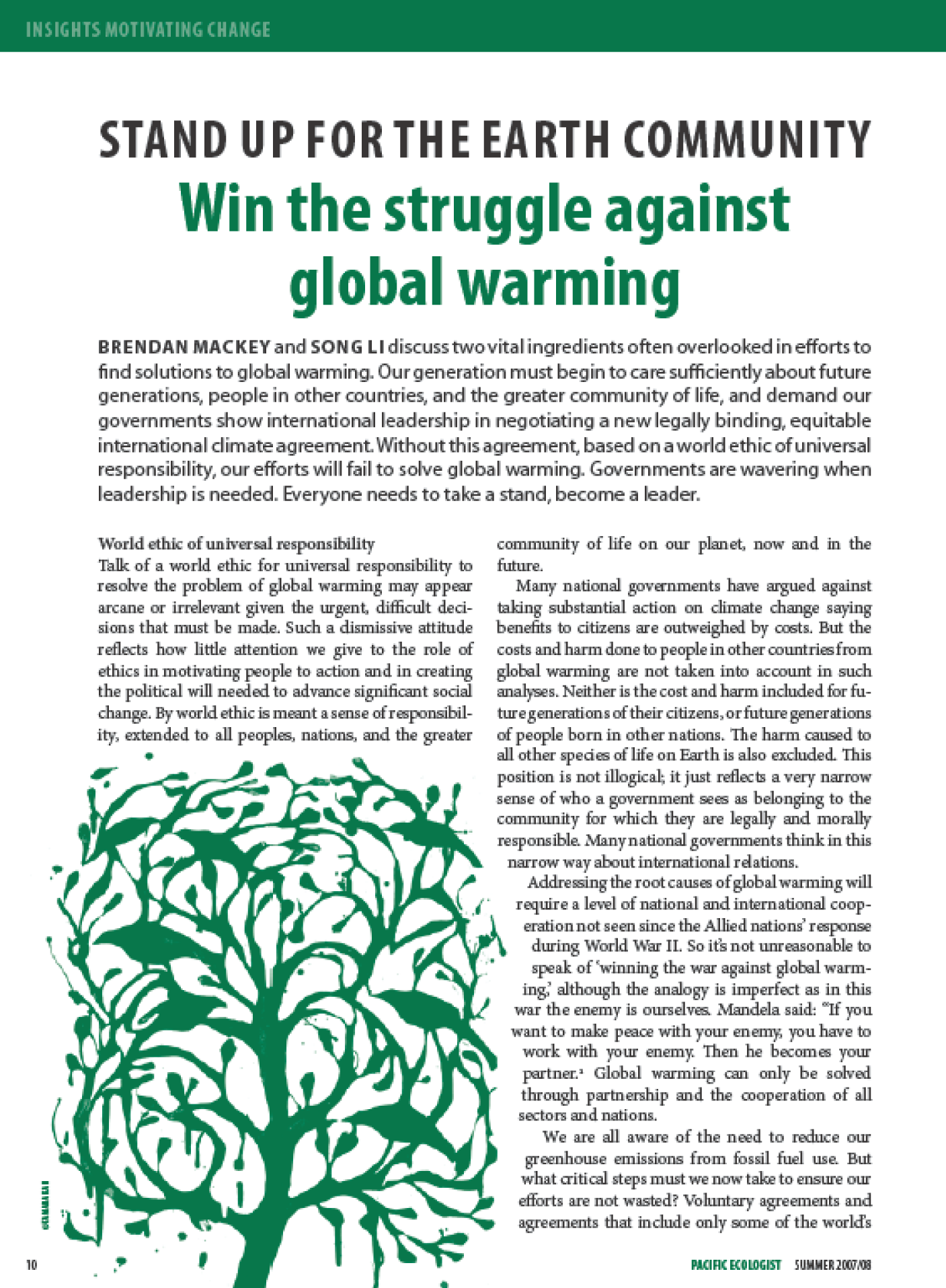Brendan Mackey
 Click logo to return to 'links-page'
Click logo to return to 'links-page'
Back to UNFCCC Submission - Back to Signatory List
The more tempered it is, the stronger it becomes.
Dear Aubrey,
I am pleased to lend my personal support to GCI's C&C Proposal to the UNFCCC.
Kind regards
Brendan
The more tempered it is, the stronger it becomes.
Prof Brendan Mackey is Director of the Griffith Climate Change response. He has a PhD in ecology from The Australian National University. Brendan’s research addresses (1) the interactions between climate change, biodiversity and land use, (2) the role of science in policy formulation of environmental regulatory frameworks, and (3) the nexus between climate change responses and sustainable development. He has a special interest in the science and policy of ecosystem-based adaptation and mitigation and related public policy issues. He is a member of he international Council for the International Union for Conservation of Nature (IUCN) and Co-chairs the Earth Charter international Council. Brendan serves on various governmental advisory bodies including the science advisory group to the Climate Change Commission. He has written over 100 academic publications including journal articles, books and books chapter.

"As with all great ideas, C&C is deceptively simple, addresses the root causes of the problem, and is recognized as a grave threat to those vested interests who fear the climate change problem’s successful resolution because of the fundamental changes it will wrought on our economic status quo. The sustained effort of GCI over 20 years is a testimony to Aubrey's integrity, commitment, and resolve. The logic and calculus of C&C is inescapable once an objective analysis is undertaken. For years, it was foolishly dismissed as impractical! Somewhat ironically, those who now view the problem with a clear head are increasingly accepting that C&C presents the only politically acceptable solution to the foundational question of how the permissible emissions can be distributed amongst the people of Earth."
Professor Brendan Mackey
Griffith University
Winning the Struggle Against Global Warming
What Will It Take? The Earth Charter Global Dialogue on Ethics and Climate Change
Brendan Mackey and Song Li
"We need C&C. Its what links the science to the politics."
Professor Brendan Mackey Griffiths University

Urgent Binding Climate Agreement
The answer is called Contraction and Convergence.4 C&C is a framework that makes governments agree on three vital questions. First, what is a safe concentration of atmospheric greenhouse gases? Secondly: When will total global greenhouse gas emissions be reduced to the amount needed to maintain atmospheric concentrations at the agreed safe level – 2050, 2100, next year? The sooner the better, of course, as the longer we wait the more harm is done to people and nature and the more expensive it becomes to fix. The third important question a C&C framework would make governments reach agreement on is how the permissible annual amount of greenhouse gas emissions will be allocated between nations. The simplest and fairest way is to give every person an equal share, called a per capita allocation. An important feature of C&C is it treats nations fairly.9 Under this framework, emission entitlements of people in a poor country will increase relative to what it is now, while that of people in a wealthy country will decrease. This is fair as historically poor countries have not caused the global warming problem and they need to now quickly develop to eliminate poverty. However, under a new C&C-framed protocol, all countries, including developing countries, will be committed to meeting their specified national greenhouse gas targets by the agreed date. Once a new protocol is in place, based on the equitable C&C framework, national governments can begin the complex task of working out how to most efficiently and fairly reduce emissions of greenhouse gases to the agreed safe level.
Stand up for the earth community
Win the struggle against global warming
BRENDAN MACKEY and SONG LI discuss two vital ingredients often overlooked in efforts to
find solutions to global warming. Our generation must begin to care sufficiently about future
generations, people in other countries, and the greater community of life, and demand our
governments show international leadership in negotiating a new legally binding, equitable
international climate agreement. Without this agreement, based on a world ethic of universal
responsibility, our efforts will fail to solve global warming. Governments are wavering when
leadership is needed. Everyone needs to take a stand, become a leader
